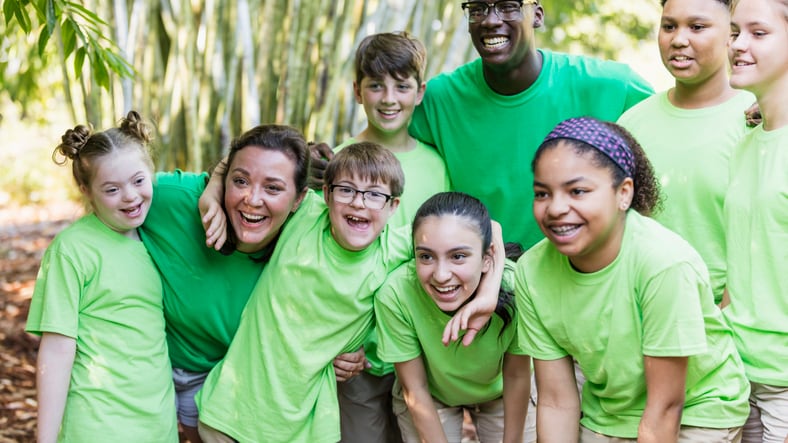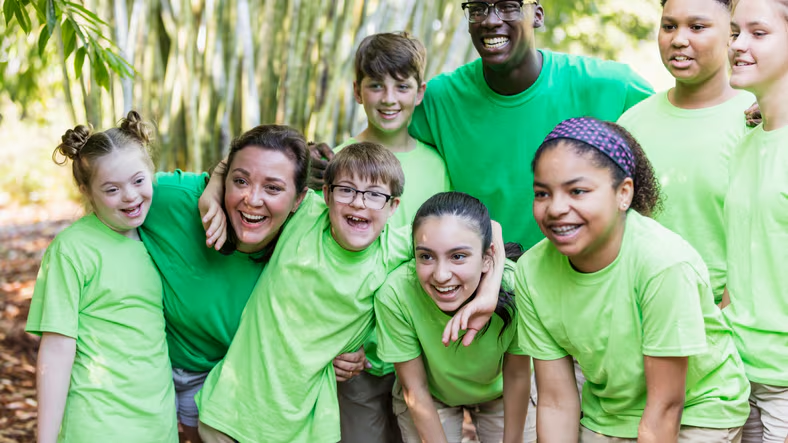Written by Nicole Fabian-Weber, Care., March 24, 2024

Finding a summer camp is never easy, but when you’re looking for a special needs summer camp, the task can feel even more challenging. Not only are you searching for a camp that provides extra support, you want a camp that will specifically help your unique and wonderful kiddo thrive. So, how exactly do you find the right one?
“When looking at special needs summer camps, the most important question a parent can ask is: What does success look like for my child and how can we work with the camp to get there?” explains Tom Rosenberg, president and CEO of the American Camp Association (ACA). “Is the camp willing to work closely with you before camp begins to put a plan together and support in place to achieve the highest degree of success? It really comes down to doing a lot of work before camp even starts.”
Renee Flax, director of camper placement at the ACA of New York and New Jersey, adds that parents and caregivers should do their part, too. “Look at websites, speak with the camp director and ask to speak with other families whose children have gone there,” she says. “Camp is a wonderful opportunity for children to make new friends, gain independence and appreciate the outdoors. Doing your research will help you find the best fit.”
Ready to start your research, but want a few jumping off points? Here, 10 special needs summer camps, along with helpful tips for your search.
Special needs summer camp options
Below, find a list of special needs summer camp options across the country, which are highly rated and/or recommended by Flax.
1. Harbor Haven Day Camp
Harbor Haven Day Camp, which Flax recommends, is best suited for kids with mild to moderate special needs, including attention-deficit/hyperactivity disorder (ADHD), Asperger’s syndrome, high-functioning autism spectrum disorder and other types of learning, communication, sensory and social challenges, according to the website.
Location: Scotch Plains, New Jersey
What to know:
- Ages 3-18.
- Transportation is provided via bus; pick up times vary and buses leave the camp at 3:30 p.m.
- Lunch can be brought or paid for in advance.
- Snacks are provided.
- Siblings can attend for one week, free of cost.
- Scholarships are available.
- Academic reinforcement mapped to IEP goals.
- Activities include swimming, crafts, performing arts, gaga ball, media, field trips and more.
2. Camp High Hopes
A year-round nonprofit camp, Camp High Hopes offers programs and respites for kids, teens and adults with diagnosed disabilities, special needs and chronic illnesses. Garnering 4.7 stars on Google reviews, Camp High Hopes has the goal of creating fun, memorable experiences for campers while fostering independence, meaningful connections and social and emotional growth.
Location: Sioux City, Iowa
What to know:
- Year-round.
- Kid, teen and adult campers welcome.
- Variety of fully-accessible activities, including ax-throwing, animal education, canoeing and more.
- Day, weekend and sleep-away options.
- Base support ratio of 1:3. One-to-one arranged as available with camp director.
- Programs are adapted to the abilities of all participants.
3. Camp Anne
Another favorite special needs camp of Flax’s is Camp Anne, an overnight nonprofit that offers a “structured, yet relaxed, atmosphere for children and adults with intellectual and developmental disabilities.” Serving people with “moderate, severe or profound disabilities,” Camp Anne focuses on increasing independence in daily living skills, confidence and communication through a variety of traditional camp activities.
Location: Ancramdale, New York
What to know:
- Ages 5 through adult.
- Overnight camp.
- Two 11-day sessions available during the summer.
- Activities include boating, cooking, crafts, sports, nature, pool parties and more.
- Camper to counselor ratio is 1:1, 2:1, or a maximum of 3:1.
- Option for chartered bus to location.
- 40 acres of fenced-in grounds.
- Special diets available, as needed.
4. The National Ability Center
With both day and overnight options, the National Ability Center focuses on providing adventure-packed activities to individuals with special needs. Choose from a variety of themed camps, including Family Camp and Adventurers Day Camp.
Location: Park City, Utah
What to know:
- Overnight and day options.
- Specialized equipment and techniques available for adventure-packed, extreme sports adaptive recreation.
- Outdoor and adventure-focused.
5. Camp Dream
With an overall rating of 4.7 stars on Facebook, Camp Dream is a hit with families. In addition to offering traditional camp activities, Camp Dream also offers motorcycle rides, boat rides and waterslides. Accepting all disability types and ages (no one has ever been turned away due to disability or financial capability), the No. 1 priority of this camp is for kids to have fun.
Location: Hampton, Georgia
What to know:
- Ages 4 through adult.
- Overnight camp.
- Camper to counselor ratio is 1:1 (or more, if necessary).
- Meals provided three times a day.
- Special diets accommodated.
- Activities such as crafts, swimming and horseback riding.
- Scholarships available.
- Pay what you can option.
6. Wonderland Camp
Wonderland Camp has been providing traditional camp activities to kids and adults with disabilities for over 50 years. Each week, there’s a different theme, so campers who are signed up for multiple weeks can have a new experience.
Location: Rocky Mount, Missouri
What to know:
- Ages 6 and up.
- Overnight camp.
- Camper to counselor ratio is 1:1.
- Activities such as a high ropes course, swimming and karaoke.
- Clinical staff on-site to accommodate all medical and dietary needs.
- $1050 per week.
- Financial assistance available.
7. Camp Yakety Yak
Camp Yakety Yak is a nonprofit day camp that helps special needs kids with their social and communication skills, with the goal of creating lifelong friendships. Each week there’s a new theme for campers, including “Under the Sea” and “Mysteries, Myths & Legends.”
Location: Lake Oswego, Oregon
What to know:
- Ages 5-22.
- High camper to staff/volunteer ratio (with 1:1 support for campers with higher needs).
- Intensive practice in social skills (5 hours a day, 5 days a week).
- Weekly “Caregiver Connection” support meetings for parents and caregivers.
- Individualized camper goal targeted on a daily basis.
- Sibling program available.
- Starts at $635 a week.
8. Ability Connection
A tween- and teen-based camp for kids with intellectual or developmental disabilities, Ability Connection provides enriching activities on a full day schedule. Their goal — aside from having fun — is to prevent social skills from sliding during the summer months.
Location: Irving, Texas
What to know:
- Ages 10-17.
- Runs from 8:00 a.m. to 4:00 p.m.
- $800 for a four-week session.
9. Camp Stand By Me
Instead of focusing on what campers can’t do, Camp Stand By Me focuses on what campers can do. Offering all the activities of a traditional summer camp, Camp Stand By Me does so in a safe, accessible, inclusive environment, with weeklong overnight options in the summer and weekend respites in the fall.
Location: Vaughn, Washington
What to know:
- Ages 7 to adult.
- Overnight.
- Activities such as campfires, boating, crafts, archery and more.
- Low camp-to-counselor ratios (with 1:1 if needed).
10. Recreation Unlimited
According to their website, the goal of Recreation Unlimited is to provide programs in “sports, recreation and education for individuals with disabilities and health concerns, while building self-confidence, self-esteem and promoting positive human relations, attitudes and behaviors.” Recreation Unlimited also hosts respite weekends.
Location: Ashley, Ohio
What to know:
- Ages 5-22.
- Day and overnight options (day runs 9 a.m. to 4 p.m.).
- Gluten- and sugar-free food alternatives.
- Traditional camp activities, such as crafts, sports and nature.
- Siblings and friends welcome.
Tips for finding the right special needs camp
During your search, there are a few key topics to discuss with camp directors and/or employees, according to Laura Buscemi, a licensed professional counselor with Thriveworks in Cherry Hill, New Jersey, who has worked with individuals with special needs for over a decade.
Here are a few she recommends talking about up front:
Ask what a typical day will look like. “Find out if there is a sense of predictability or if activities change and rotate,” she says. “And, if plans need to change, how are they communicated and addressed with the kids? You and your child will want to know what to expect, as best as anyone can.”
Conflict management. “Find out what the camp’s practices are for addressing camper issues,” she says. “What is in place to proactively avoid conflicts between campers and how is this addressed reactively after a peer conflict has occurred? If there are concerns, on behalf of your child or yourself, ask how these get addressed and what the protocol looks like?”
Discipline and behavior modification. “Ask what their practices look like for explaining and enforcing rules and consequences, both positive and negative,” notes Buscemi. “You will want to know how they approach behavior modification to make sure it is in line with your own values. Make sure to ask about practices regarding crisis management. If the camp uses restraining or other isolation practices this is something you are going to want to know ahead of time.”
Programs adaptability/willingness to problem solve (within reason). “Ask about their flexibility in placing unwanted demands on your child,” she says. “Is there an alternative activity they can do if they aren’t able to engage without difficulty? Is there an alternative snack if they don’t like the one they’re given? Having a clear understanding of what a program is and is not willing to do will give you an idea of what kind of collaborative partner you have for giving your child a great summer experience!”
Flax adds that it’s also important to speak with your child’s teachers and therapists when narrowing down camps. “They know how your child behaves in a group setting, which is vital information for you and the camp you will be selecting,” she says. “Your child’s IEP goals should be considered so that the camp can help to promote their socialization, behavior, language, motor skills or educational skills.” Finally, consider using the Find A Camp tool on the ACA website, which helps families search for camps based on location, program type, activities and more.
